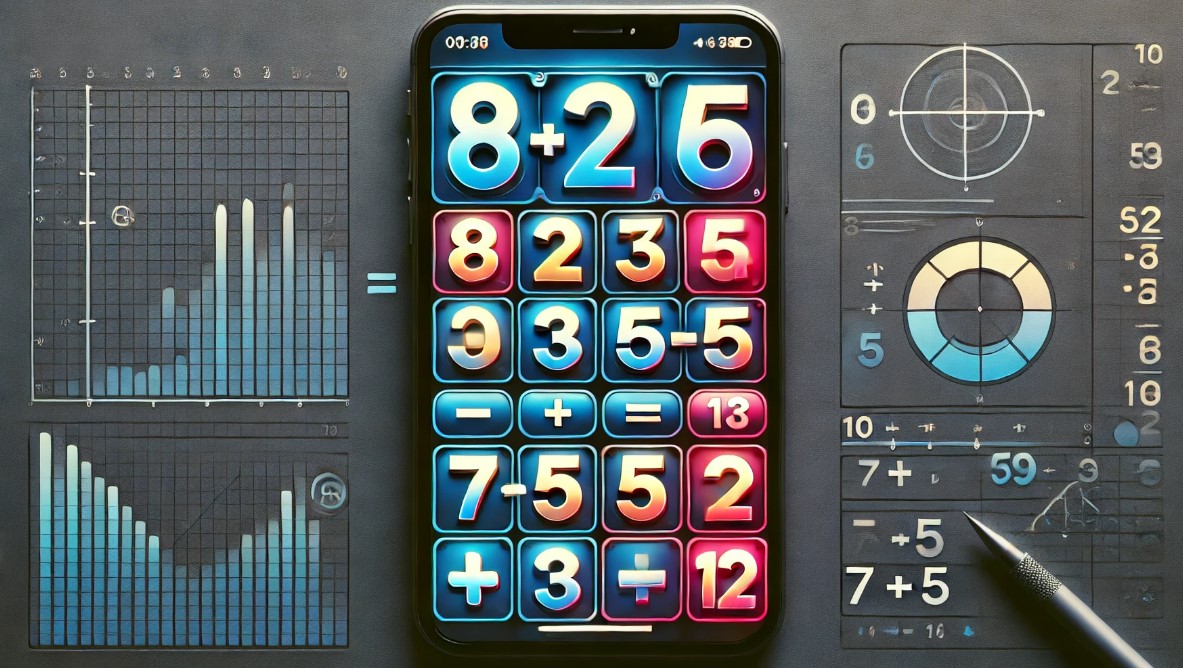In recent years, puzzle games have dominated the gaming landscape, and Nerdle is one of the latest to capture the imagination of players in the UK. Like the globally popular Wordle, Nerdle shifts the focus from words to numbers, challenging players to solve mathematical equations.
This daily math puzzle is not just a game of luck but one of logic, strategy, and mathematical reasoning. Whether you’re a math whiz or simply enjoy a good brain teaser, Nerdle offers an entertaining and educational experience appealing to puzzle enthusiasts of all ages.
What is Nerdle?
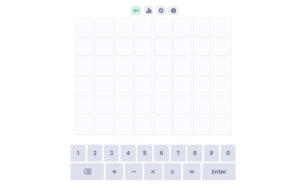
Nerdle is a web-based puzzle game that solves mathematical equations instead of finding words. Founded in early 2022 by London-based data scientist Richard Mann and his children, it grew in popularity due to its connection to Wordle and its unique twist on puzzle-solving.
Players have six chances to guess the correct equation by inputting a combination of numbers and arithmetic operators such as addition (+), subtraction (-), multiplication (*), and division (/). The final equation also includes the equals sign (=). Much like Wordle, each guess gives players feedback, with colour-coded hints helping to guide them toward the correct solution.
Each equation must be exactly eight characters long, including numbers and symbols that result in a valid mathematical statement. For example, a correct equation could look like 3 + 5 = 8, whereas something incomplete like 5 + would not be allowed.
Understanding both arithmetic rules and pattern recognition is the key to mastering Nerdle, which makes it a unique game that blends education with entertainment.
Disclaimer: Nerdle Game is a trademark of its respective owner. All copyrights and trademarks are the property of their respective owners. This site does not claim any ownership and provides access for informational and entertainment purposes only.
How to Play Nerdle Game?
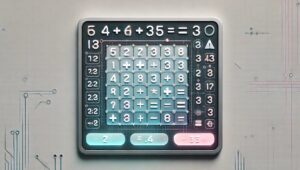
To begin playing Nerdle, players must first input a complete mathematical equation in their first attempt. The game then provides feedback based on the accuracy of the numbers and operators in the guess. The colour-coded feedback helps players adjust their guesses in subsequent turns:
- Green indicates the correct number or symbol is in the correct position.
- Purple indicates the correct number or symbol, but it is in the wrong position.
- Black shows that the number or symbol does not appear in the equation.
Players have six attempts to guess the correct equation, and each guess should be logical based on previous feedback. The strategic process of elimination is essential to winning within the allotted number of guesses.
MiniNerdle is a smaller, simplified version of the game. With only six characters per equation, it is an excellent starting point for beginners or those looking for a quicker challenge.
Nerdle Game to Play in:
What Are the Nerdle Game Rules and Game Structure?
Nerdle’s basic rules are simple but require attention to detail and mathematical knowledge:
- Equation Length: All Nerdle equations are exactly eight characters long, consisting of numbers, operators, and an equal sign.
- Order of Operations: Players must ensure that the equation follows the correct order of operations, following the standard PEMDAS rule (parentheses, exponents, multiplication and division, addition and subtraction).
- Valid Entries: The game only accepts rational, whole-number solutions. Decimals and irrational numbers are not allowed in equations.
Players must be precise in their equations, as even a small misstep can result in an incorrect guess. For example, inputting 10 + 5 = 3 would not be accepted, as the equation is mathematically invalid. The focus on logical structure is what makes Nerdle more than just a guessing game—it’s a true test of arithmetic skills and logical reasoning.
What Are the Nerdle Game Strategies for Success?

While Nerdle may initially seem daunting, employing the right strategies can help players master the game. Here are some tips to increase your chances of solving the puzzle within six attempts:
- Diversify Your First Guess: Start by using as many different numbers and operators as possible. This broadens the feedback in the first round, allowing you to eliminate several options and narrow down your guesses.
- Process of Elimination: Once you’ve ruled out incorrect numbers and operators (marked in black), focus on rearranging those that appear in purple and green to find their correct positions.
- Logical Guessing: Each guess should be based on the feedback from previous attempts. Avoid repeating rejected numbers or symbols, and always ensure that your equation follows the basic rules of arithmetic.
- Trial and Error: Don’t be afraid to experiment with different combinations of numbers and operators. Sometimes, discovering the right solution requires a mix of logic and trial and error.
Nerdle is less about speed and more about accuracy, so take your time to think through each guess and ensure it’s as logical as possible.
What Are the Common Mistakes to Avoid?
Like any puzzle game, there are common pitfalls to avoid in Nerdle. Here’s a list of mistakes that can hinder your success:
- Guessing Without Strategy: Avoid making random guesses. Use the feedback from each round to guide your next move.
- Ignoring the Order of Operations: Always remember that Nerdle follows PEMDAS. Failing to adhere to this order can lead to incorrect equations.
- Reusing Incorrect Numbers or Symbols: Once a number or symbol has been marked as black, it will not appear in the final equation. Reusing it wastes a valuable guess.
Staying aware of these common mistakes can improve your gameplay and increase your chances of solving the puzzle.
What Are the Advanced Nerdle Techniques?
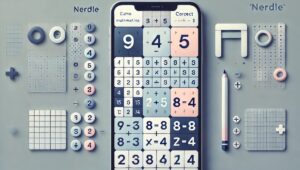
For players who want to go beyond the basics, there are advanced strategies that can help you crack even the toughest puzzles:
- Pattern Recognition: You’ll start noticing patterns in the feedback over time. If certain numbers or operators frequently appear together, use this to your advantage in future guesses.
- Deduction: As you receive more feedback, the puzzle becomes a game of deduction. Try to narrow down the possibilities with each new guess, making educated assumptions based on what you already know.
- Breaking Down Complex Equations: Sometimes, it’s easier to break down the equation into smaller components. For example, if you’re stuck on a long equation, try to solve the first half before worrying about the second half.
Why Nerdle is a Great Brain Teaser?
Nerdle isn’t just fun—it’s a mental workout. Regularly playing Nerdle can help improve cognitive functions, particularly problem-solving skills and mathematical thinking. The game challenges players to think critically and quickly about numbers, making it an excellent brain exercise for players of all ages.
In addition to providing entertainment, Nerdle fosters a better understanding of mathematical principles, making it a valuable tool for sharpening one’s mind.
Nerdle Answers for the Past 30 Days
September 28, 2024:
- Answer: 14 – 5 – 3 = 6
This equation involves two subtractions. First, 14 is reduced by 5 to give 9, and then 3 is subtracted from 9, resulting in a final answer of 6. This puzzle tests your subtraction skills and the ability to perform multiple operations in sequence.
- Answer: 8 * 18 = 144
This equation emphasizes multiplication, where multiplying 8 by 18 results in a product of 144. The large numbers make it a more complex challenge, requiring quick calculations of basic arithmetic.
September 25, 2024:
- Answer: 7 * 8 + 3 = 59
A combination of multiplication and addition, where the product of 7 and 8 (56) is added to 3, resulting in 59. This equation showcases the importance of understanding the order of operations.
September 24, 2024:
- Answer: 48 + 29 = 77
This simple addition problem presents a straightforward challenge for players who prefer more basic calculations.
September 23, 2024:
- Answer: 10 + 7 – 8 = 9
A mixed operation of addition and subtraction, resulting in 9. While relatively simple, this problem requires attention to the order of operations to avoid mistakes.
September 22, 2024:
- Answer: 10 / 2 – 1 = 4
This equation combines division and subtraction. Dividing 10 by 2 gives 5, and subtracting 1 results in 4.
September 21, 2024:
- Answer: 7 * 58 = 406
A more complex multiplication problem, where 7 is multiplied by 58 to get 406. This requires familiarity with larger numbers and quick mental multiplication.
September 20, 2024:
- Answer: 72 / 9 – 2 = 6
Here, division and subtraction are combined. Dividing 72 by 9 gives 8, and subtracting 2 results in 6.
September 19, 2024:
- Answer: 91 * 2 = 182
A simple multiplication problem that results in 182 when 91 is multiplied by 2. This emphasizes basic arithmetic with large numbers.
September 18, 2024:
- Answer: 86 – 49 = 37
This subtraction problem results in 37 when 86 is reduced by 49. A straightforward equation for fans of basic operations.
September 17, 2024:
- Answer: 7 + 8 – 2 = 13
This equation combines addition and subtraction, resulting in 13. It’s a quick calculation requiring minimal effort.
September 16, 2024:
- Answer: 9 + 8 – 16 = 1
Another combination of addition and subtraction, where attention to detail is needed to avoid mistakes.
September 15, 2024:
- Answer: 41 – 5 * 8 = 1
This equation blends subtraction and multiplication, emphasizing the importance of the order of operations.
September 14, 2024:
- Answer: 20 / 5 / 2 = 2
A division problem that involves dividing 20 by 5, and then the result by 2, to get 2.
September 13, 2024:
- Answer: 3 + 6 + 7 = 16
A straightforward addition equation where three numbers are added to result in 16.
September 12, 2024:
- Answer: 22 * 9 = 198
A simple multiplication problem where 22 is multiplied by 9, resulting in 198.
September 11, 2024:
- Answer: 22 + 26 = 48
This addition equation results in 48 when 22 and 26 are combined.
September 10, 2024:
- Answer: 4 + 1 + 9 = 14
A straightforward addition problem where the sum of 4, 1, and 9 equals 14.
September 9, 2024:
- Answer: 25 – 8 – 8 = 9
A subtraction problem that results in 9 after subtracting 8 twice from 25.
September 8, 2024:
- Answer: 58 – 22 = 36
A simple subtraction equation resulting in 36 when 22 is subtracted from 58.
September 7, 2024:
- Answer: 19 – 7 – 5 = 7
This equation combines two subtractions to get a result of 7.
September 6, 2024:
- Answer: 12 * 2 / 8 = 3
A mix of multiplication and division, where the product of 12 and 2 is divided by 8 to result in 3.
September 5, 2024:
- Answer: 14 + 17 = 31
A straightforward addition equation where 14 and 17 are combined to result in 31.
September 4, 2024:
- Answer: 9 * 3 + 3 = 30
An equation that combines multiplication and addition to result in 30.
September 3, 2024:
- Answer: 12 + 3 – 6 = 9
This simple equation uses addition and subtraction to arrive at 9.
September 2, 2024:
- Answer: 15 + 12 = 27
An addition problem that results in 27 when 15 and 12 are combined.
September 1, 2024:
-
- Answer: 5 * 3 + 1 = 16
A combination of multiplication and addition, where 5 multiplied by 3, plus 1, results in 16.
- Answer: 5 * 3 + 1 = 16
Top 5 Similar Games for Nerdle
1. Wordle
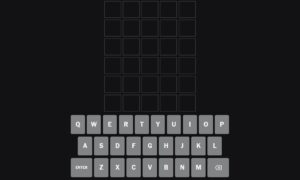
How to Play:
- The goal of Wordle is to guess a hidden five-letter word in six attempts.
- After each guess, the game provides feedback in the form of coloured tiles:
-
- Green: Correct letter in the correct position.
- Yellow: Correct letter, but in the wrong position.
- Grey: Letter is not in the word at all.
Rules:
- Players have six guesses to find the word.
- Words must be valid dictionary entries.
- Each guess must be a five-letter word (not a random combination of letters).
Gameplay:
- Wordle is a simple but addictive word game with one daily puzzle. Feedback after each guess helps you refine your guesses and eliminate wrong letters and positions.
Recommended For:
- Word lovers and fans of quick daily puzzles. Ideal for those who enjoy using deduction and vocabulary to solve problems.
Wordle Game to Play in:
2. Quordle
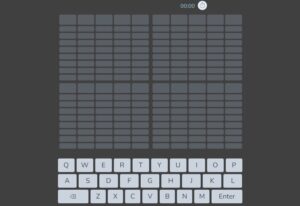
How to Play:
- In Quordle, players solve four Wordle-style puzzles simultaneously, using the same guesses across all four grids.
- Each guess applies to all four words, and feedback is given independently for each puzzle.
Rules:
- Players have nine guesses to solve all four words.
- The same feedback system from Wordle (green, yellow, and grey) applies, but it operates across all four words at once.
Gameplay:
- Quordle ramps up the challenge by forcing players to balance four puzzles simultaneously. You must carefully choose your guesses to provide useful feedback for multiple words in one attempt.
Recommended For:
- Wordle veterans who want a more challenging experience. Perfect for puzzle solvers who enjoy multitasking and handling complex problem-solving.
Quordle Game to Play in:
3. Mathler
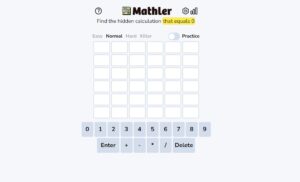
How to Play:
- In Mathler, players must guess a math equation that equals a specific target number.
- The equation can include addition (+), subtraction (-), multiplication (*), and division (/).
Rules:
- The equation must be valid and follow the order of operations (PEMDAS).
- Feedback is provided similarly to Nerdle:
-
- Green: Correct number/operator in the right position.
- Yellow: Correct but misplaced.
- Grey: Not in the equation at all.
Gameplay:
- Players must experiment with different mathematical combinations until they find the correct equation that matches the target number. The challenge lies in balancing the equation within the set rules of mathematics.
Recommended For:
- Math enthusiasts and players who enjoy puzzles that require numerical thinking and arithmetic. It’s a perfect game for those who prefer number puzzles over word games.
Mathler Game to Play in:
4. Heardle

How to Play:
- Heardle is a music-based puzzle where players must identify a song by listening to a short snippet of its intro.
- With each incorrect guess, more of the song is revealed, giving players up to six snippets to identify the song.
Rules:
- The game plays the first second of a song, and players must either guess the track or skip to the next snippet.
- Snippets grow progressively longer with each turn.
Gameplay:
- Heardle is an auditory puzzle, relying on players’ musical knowledge and memory. Each additional snippet provides a better chance to identify the song, but players who can guess earlier score higher.
Recommended For:
- Music lovers and fans of trivia. It’s ideal for those who have a wide range of musical knowledge and enjoy testing their memory of songs and artists.
Heardle Game to Play in:
5. Sudoku
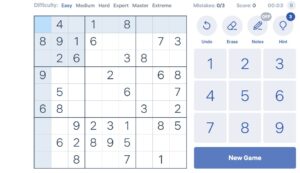
How to Play:
- Sudoku is a grid-based number puzzle. The goal is to fill a 9×9 grid so that each column, row, and 3×3 section contains the numbers 1 through 9, with no repetitions.
Rules:
- Each puzzle starts with some numbers already filled in.
- Players must complete the grid by ensuring that no number repeats in any row, column, or 3×3 box.
Gameplay:
- Sudoku requires logical thinking and pattern recognition. Players work through the puzzle by filling in numbers step by step, ensuring they don’t violate the game’s rules. More advanced puzzles require deeper logic and more complex deduction strategies.
Recommended For:
- Fans of logic puzzles and number-based challenges. Sudoku is perfect for those who enjoy a slow, methodical puzzle-solving experience, where each step must be carefully considered.
Sudoku Game to Play in:
Conclusion
Nerdle is a refreshing and stimulating puzzle game that offers a unique twist on traditional number puzzles. It challenges players to think critically about math while having fun, and with regular practice, you’ll become a master at solving its daily challenges.
Whether you’re new to the game or looking to enhance your skills, Nerdle is a fantastic way to sharpen your mind.
What Are the FAQs About Nerdle Game?
What happens if I input the correct numbers but in the wrong order?
Nerdle will give you feedback with purple squares, indicating that the number or operator is correct but in the wrong position.
Can the same number appear multiple times in Nerdle?
Yes, numbers can repeat within a single equation. Each instance is treated separately, so the feedback for one occurrence does not apply to another.
How many Nerdle games can I play in a day?
Players get one new Nerdle puzzle daily, but they can also play MiniNerdle for an additional challenge.
How does Nerdle compare to other Wordle-style games?
While Wordle focuses on words, Nerdle is entirely based on numbers and math equations, offering a different type of logic challenge.
Can I play Nerdle on mobile?
Yes, Nerdle is available on both desktop browsers and mobile devices, making it accessible anywhere.
What math operations are used in Nerdle?
The game uses addition (+), subtraction (-), multiplication (*), division (/), and the equal sign (=) in its equations.
Is there a time limit for playing Nerdle?
No, there’s no time limit for completing a puzzle, but new puzzles are released daily at midnight GMT.

